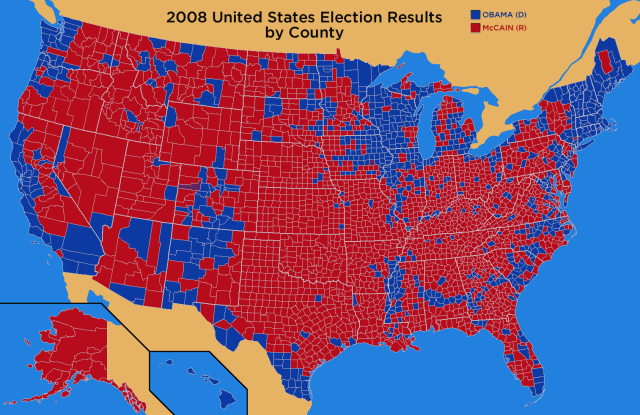Instead of wasting time with term limits, codes of ethics, or campaign finance reform laws, what if we redesigned the federal electoral process by allocating electoral college votes by county, with one county = one electoral college vote? In the alternative, what if congressional districts for the U.S. House of Representatives were based on the existing map of counties within each State, with one member of Congress per county? One problem with our proposal, however, is practical: the House would have to increase in size from 435 members to over 3000! According to Wikipedia, for example, there are 3007 counties, 64 parishes, 19 organized boroughs, 11 census areas, 41 independent cities, and the District of Columbia, for a total of 3,143 counties and county-equivalents in the U.S. We would thus need to build a bigger Congress or find another way to house so many congressmen.




A county in the U.S. is simply an administrative division of the state, like a prefecture. It exists not for bottom-up representation but for top-down distribution of governance and services. Perhaps the better question to ask is, why are not counties better aligned with election districts?
True, but that’s precisely why I like counties so much for election districts, i.e. lower levels of gerrymandering!
It’s a fun idea, but it goes against the whole idea of proportional representation as contemplated by the Framers. Counties are not based on population size.
One idea I’d like to see is an elimination of winner-take-all rules. Allow each elector be selected by congressional district, plus two at-large. It seems unfair that people’s votes are diluted by winner-take-all simply because their viewpoints are in the minority in that state.
“Each elector be selected by congressional district, plus two at-large” — good idea. But this is up to the states, currently. Maine and Nebraska do a version of this now. A question I would like Enrique to explore is — what is the relevance of a “state” in modern America? States are more anachronistic and probably less representative than counties!
That’s a great point. I wish I remembered the professor’s name, but I still remember an idea he presented at a conference I attended in Chicago in 2010: the idea of replacing states with “greater metropolitan areas”
I agree that proportional representation is more “democratic” than winner-take-all. Notice too that if each county were allocated one electoral college vote, the outcome of the last two presidential elections would have been different
Counties might often serve as good political districts in that, counties being set up for efficient distribution of state services, the people in the county have a common stake in arguing for their services. But that just means that the residents of the county have something in common. It does not mean that the needs of one county can be compared to that of another county on an equal basis. One county could have 10,000 residents, another county 1,000,000. What is equitable in that case?
That’s true … But the same criticism applies to the existing Electoral College system!